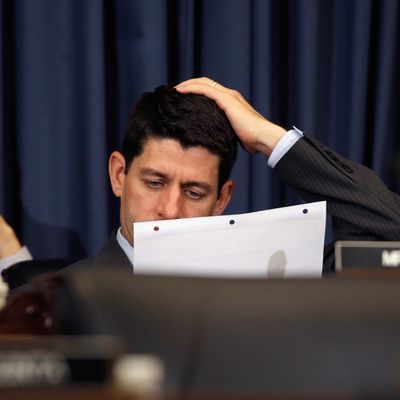
The mantle of earnest, problem-solving wonk that Paul Ryan has adorned like armor has frayed over the last year as it has grown increasingly obvious that he is not merely a supporter of the GOP’s hard-line, no-anti-tax, no-negotiation stance but its mastermind. Ryan gives an interview to Washington Post columnist Ruth Marcus today that signals a fallback strategy, allowing him to recapture some of the magic that made centrists swoon while hewing to the ultra-anti-tax line.
Marcus is one of those centrists who imagined Ryan as a slightly more conservative member of their same tribe — here she is in 2011 projecting him as eager to compromise on higher taxes — and she now concedes Ryan won’t take any deal like that. Instead he explains that his refusal to deal on the budget is borne of “his zeal for tax reform.” Ryan thinks if loopholes are closed without lowering rates, there will be no sweetener to make tax reform work. “There is some method to this anti-tax madness,” she concludes.
There is a method here. But it’s not what Ryan says.
Ryan’s plan here assumes that it’s possible to pass a tax-reform bill later this year. Is that plausible? Of course not. Obama is not going to sign a tax-reform law that locks in lower rates and eliminates the prospect of increasing revenue. Indeed, Marcus herself predicts that Washington will be facing a “months-long slog, from sequester to continuing resolution to, yes, another debt-ceiling showdown sometime this summer.” With Republicans continually precipitating fiscal crises and refusing to negotiate, obviously tax reform is not going to pass. Or, at least, Republicans will have to concede on revenue as a precondition for tax reform having a chance.
And of course passage is not the point. Wall Street Journal editorial columnist Kimberly Strassel reports, with far more candor than Marcus coaxes from Ryan, that the Republican plan is to use tax reform as a message platform, not to pass a bill.
The chronology of this strategy dates back a couple of years. Republicans had been dangling tax reform as a kind of vague catch-all slogan to obscure their unpopular tax policy of defending low rates for the rich at all costs. The attraction of this strategy is that, by couching their stance in an unspecified future reform, they could avoid committing themselves in public to positions that could be measured and scrutinized. Ryan himself frequently convinced moderates like New York Times columnist James Stewart he really wanted to reform the tax code in a way that would make the rich pay more. And so they spent a couple of years decrying the wasteful loopholes and subsidies in the tax code and pledged to clean them up in some unspecified way.
Obama has turned this rhetoric back on the Republicans. You hate all these special interest breaks, you say? Okay, why don’t we close some of them, in return for the entitlement cuts you say are so vital. And in fact Republicans don’t actually want to cut any loopholes out of the tax code at all. This has left them stuck.
Their way out is to insist on a future tax reform that uses all the savings to reduce rates. As Strassel writes, “it’s a GOP response to Mr. Obama’s ‘fairness’ line, allowing the party to stand with the millions of average Americans who can’t afford tax lawyers or lobbyists to carve out shelters.” So now Republicans can couch their stance in a kind of two-step maneuver. They can proclaim their opposition to tax deductions and loopholes while using the prospect of a future tax-reform bill that they know will never pass as a reason to refuse to close any tax deductions for the rich as part of a budget deal.
The irony here is that tax reform was always the secret sauce in the illusory belief that Republicans could be coaxed into supporting a bipartisan debt-reduction plan. All the “plans” to reduce the debt — Bowles-Simpson, the Senate bipartisan gangs — hinged on Democrats agreeing to cut retirement programs in return for Republicans accepting higher revenue and lower rates. But there was never any real agreement on the tax end. It was always just a target attached to vague gestures. In truth, the Republicans remain as fanatically anti-tax as ever. The only way to get revenue out of them was, and is, to pry it from their cold, dead hands.






























